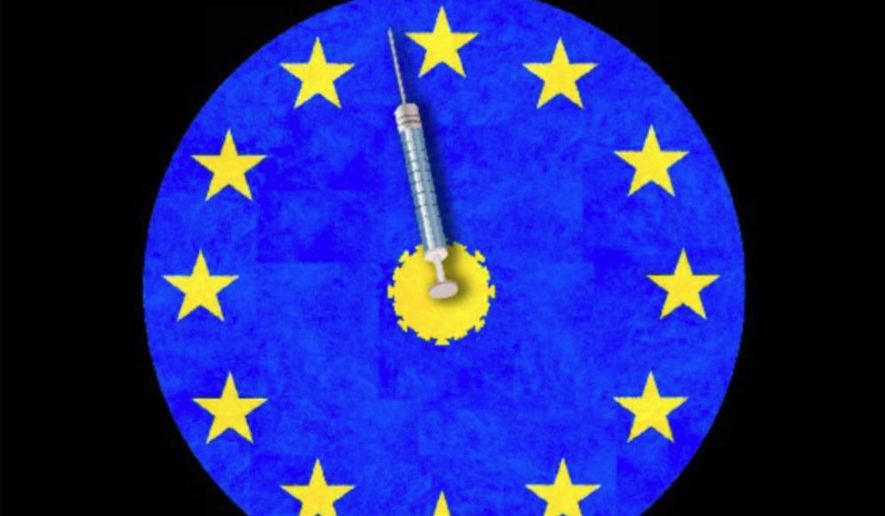OPINION:
John F. Kennedy once said that Washington is a city of northern charm and southern efficiency. The European Union, in its obtaining and distributing anti-COVID-19 vaccines, demonstrated the charm of the IRS and the speedy efficiency of the DMV. Burdened by a domineering bureaucracy and squabbling among governments, the EU has created a crisis for its 450 million citizens.
This dismal failure of the EU is proven by a comparison between the actions of former President Trump and those of the EU leaders who so consistently mocked him.
By the end of April 2020, 17 Schengen Agreement nations, which had allowed free cross-border movement of people, established border controls. In response, the first thing the EU did was grant itself more power, including the centralization of vaccine procurement.
But procurement went slowly, according to an extensive report in The Economist. Though France, Germany and Italy had ordered 400 million doses of the AstraZeneca vaccine in the spring of 2020, purchasing authority was passed to the EU bureaucracy, which had little experience in buying anything quickly.
The European Medicines Agency, for example, stood by its old procedures, compounding delays. In contrast the U.S. and U.K., while ordering massive amounts of vaccine, deregulated the process and provided limited liability for manufacturers months before the vaccines were approved.
Because virus vaccines had usually taken a decade to develop, the Trump administration launched “Operation Warp Speed” in May, providing about $12 billion in aid to pharmaceutical companies to accelerate vaccine development and production. President Trump promised hundreds of millions could be vaccinated by Election Day. He was only about a month off.
Mr. Trump’s team had, by May, examined hundreds of candidate vaccines and, by then, had narrowed the choices to 14. In July, it ordered $2 billion of vaccines — probably 50 million doses. This gave the manufacturer — Pfizer/BioNTech — a huge boost in funding for research and proving its vaccine. Other manufacturers such as AstraZeneca, were collaborating with the administration. AstraZeneca alone promised 300 million doses by January.
Divisions among EU countries were exacerbated by the exact “vaccine nationalism” for which they’d castigated Mr. Trump. France, for example, placed a huge order for vaccines from Sanofi, a French company. As winter approached, Moderna — like Pfizer/BioNTech, a U.S. manufacturer of MRNA vaccines — warned that the EU was dragging out negotiations over price. In January 2021, the Sanofi vaccine failed to prove out in tests, further delaying their supply.
At that point, AstraZeneca said it would not be able to provide all the promised doses to the EU but promised to make its best efforts to produce and deliver the vaccines.
The 27 members of the EU are suffering a severe third wave of the COVID-19 pandemic. France announced a nationwide lockdown of schools and non-essential businesses. Germany announced a strict lockdown over Easter and then changed its mind. Italy instituted a strict lockdown over the Easter weekend and has banned non-essential travel. Spain has a curfew and limits the number of people who can gather anywhere. Still, the “third wave” of COVID-19 infections is rampant among EU nations.
Reportedly, the EU now has a surplus of the AstraZeneca vaccine, which people are reluctant to receive. That is probably the result of French President Emmanuel Macron’s irresponsible statement that it was only “quasi-effective” for people over 65.
As a result of the EU fiasco, only about 11% of EU citizens have received their first shot. Over 40% of Americans have received their first, and over 20% have received the second. Britain, which followed the U.S. “damn the torpedoes, full speed ahead” approach has vaccinated nearly 60% of its population and is easing its lockdown.
In several EU nations, hospital intensive care units are packed with COVID-19 patients. In frustration, some EU members are ready to break ranks and buy Russian or Chinese vaccines. The Russian “Sputnik V” vaccine is already in use in Hungary and Slovakia. Germany, Italy and Austria are considering purchasing the Russian vaccine.
Those ready to break ranks may want to consider the fact that Argentinian President Alberto Fernandez received two doses of the Russian vaccine but has recently tested positive for the disease. Acceptance of the Russian vaccine would be a considerable win for Russian President Vladimir Putin by further dividing the NATO nations.
The German government temporarily stopped use of the AstraZeneca vaccine in late March because of very rare side effects. Infections in Germany are spreading rapidly and Germans, like many EU citizens, are fed up with government incompetence, demonstrated by the government’s plummeting poll numbers.
This experience should be a lesson for those who believe in the idea of a European military capable of defending the continent without U.S. help. It won’t be for the 21 members of the EU that are also members of NATO because President Biden won’t demand that they invest in their own defense.
One of the EU’s founders, Jean Monnet, said, “Europe will be forged in crises, and will be the sum of the solutions adopted for those crises.” Since the EU’s founding in 1993, its biggest crises have been the 2009 euro crisis and the COVID-19 pandemic. The former continues, abated by the strength of the German and French economies. The latter is an ongoing disaster.
• Jed Babbin, a deputy undersecretary of Defense in the George H.W. Bush administration, is the author of “In the Words of Our Enemies.”




Please read our comment policy before commenting.